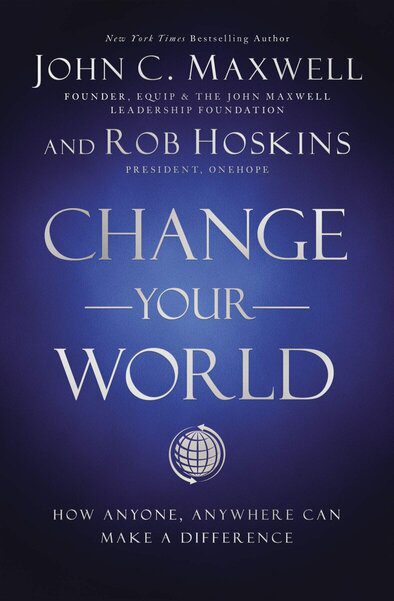In Change Your World: How Anyone, Anywhere Can Make a Difference, bestselling authors John C. Maxwell and Rob Hoskins provide a framework to get started being the change you want to see – in your community and beyond.
People Change When They Hurt Enough That They Have To, People Change When They See Enough That They Are Inspired To, People Change When They Learn Enough That They Want To, People Change When They Receive Enough That They Are Able To.
People Change When They Hurt Enough That They Have To
The most basic impetus for change is pain. From the time we are first able to make choices as a child, we instinctively avoid pain. But a better response to pain is to change so we are no longer hurt by it.
People Change When They See Enough That They Are Inspired To
People Change When They Learn Enough That They Want To
When you believe there’s nothing you can do about a problem, it’s disheartening and demotivating. But when you begin to learn how you can take steps to start making a difference, it will propel you to take action.
People Change When They Receive Enough That They Are Able To
Hope has two beautiful daughters; their names are Anger and Courage. Anger at the way things are, and Courage to see that they do not remain as they are. —AUGUSTINE OF HIPPO
The Power of Timing
CHANGE STEPS FORWARD WITH URGENCY: AT A TIME WHEN IT MAKES A DIFFERENCE
The phrase “strike while the iron is hot” comes from the blacksmithing trade. Metalworkers understand that timing is crucial if they want to successfully manipulate metal. Steel, for instance, needs to be at the optimum temperature to be able to work it. If the metal is cold, it won’t move at all when struck with a hammer. If it’s not heated enough, even a lot of hammering will make only the smallest of changes. On the other hand, if the metal is too hot, it can melt, rendering it worthless. There is a very short window of a few seconds when the steel’s temperature is just right. The smith must strike quickly, because the metal doesn’t stay at the perfect temperature for very long.
The process begins with you. The scale of what you do doesn’t matter. If you’re willing to embrace change yourself and take action, the transformation process has already begun. You’ve already started to become a catalyst. And you can change your world.
HOW TRANSFORMATION HAPPENS
A WATERFALL: TOP-DOWN—IT REQUIRES LEADERSHIP
Transformation begins with influence, and influence always flows from the top down, like a waterfall, not upward. For transformation to happen, the leaders must be involved. Influence flows down, not up. Leadership buy-in at the top of the waterfall allows our transformational efforts to cascade down into the eight streams of influence and then throughout the country.
A LADDER: BOTTOM-UP—IT ENCOURAGES MOBILITY
While influence flows down, transformation climbs up. That’s why we associate it with the image of a ladder. When you help people to improve their lives, they rise up. They begin to dream of a better world, which is fantastic, because the only tragedy greater than dying with dreams unfulfilled is never to have dreamed at all.
For leadership to be good and lasting, it must be preceded by good living. Good living comes from good values.
Forms of Golden Rule
- Christianity: “Do to others whatever you would like them to do to you.” – “Matthew 7:12 NLT
- Islam: “None of you has faith until he loves for his brother or his neighbor what he loves for himself.” – “Sahih Muslim, Book 1, Number 72,”
- Judaism: “What is hateful to you, do not do to your fellow man. This is the entire Law; all the rest is commentary.” – Talmud, Shabbat 3id
- Buddhism: “Hurt not others in ways that you yourself would find hurtful.” – Udana-Varga 5,1,
- Hinduism: “This is the sum of duty; do naught unto others what you would not have them do unto you.” – Mahabharata 5,1517,
- Zoroastrianism: “Whatever is disagreeable to yourself do not do unto others.” – “Shayast-na-Shayast 13:29”
- “Confucianism: “Do not do unto others what you would not have them do to you.” – Analects 15:23,
- Bahai: “And if thine eyes be turned towards justice, choose thou for thy neighbour that which thou choosest for thyself.” – “Epistle to the Son of the Wolf”
- Jainism: “A man should wander about treating all creatures as he himself would be treated.” – Sutrakritanga 1.11.33
- Yoruba Proverb (Nigeria): “One going to take a pointed stick to pinch a baby bird should first try it on himself to feel how it hurts.” – African proverb
All the Best in your quest to get better. Don’t Settle: With Passion.



Comments are closed.